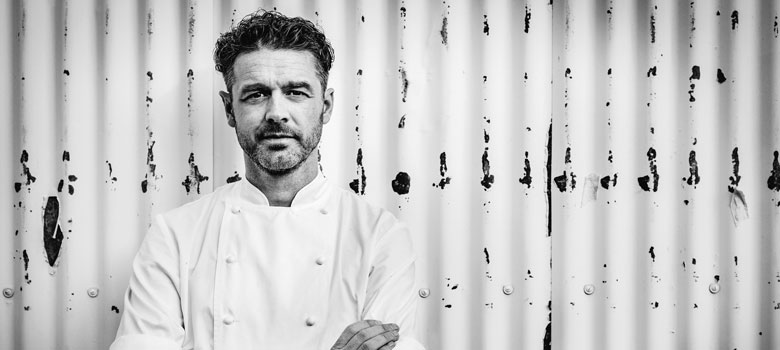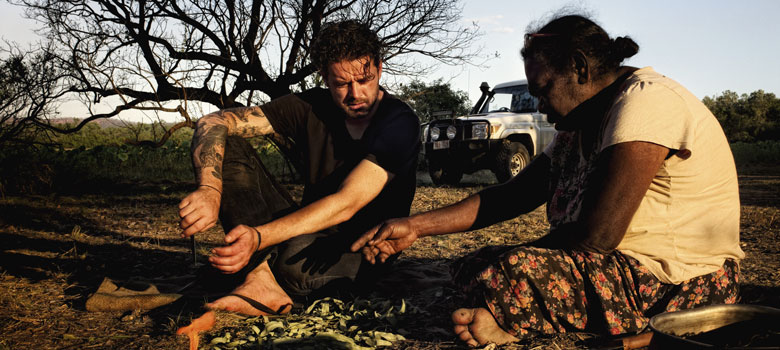
Food
Jock Zonfrillo: An Act of Preservation
While acclaimed chef Jock Zonfrillo admits that the commercialisation of native ingredients is inevitable, he’s working with indigenous communities to ensure they’re the beneficiaries of this burgeoning industry.
Having been in the kitchen since he was 11, Jock Zonfrillo, a half Scottish, half Italian chef, has seen it all when it comes to the food and wine industry. He has worked in Michelin-starred establishments, including Marco Pierre-White’s, and he has bounced around the world, cooking and searching for his place within it.
At the end of 1999, Jock was head chef at Sydney’s fine dining institution Level 41. One day, he was walking around Circular Quay, when he came across an Indigenous Australian busker called Jimmy. They struck up a conversation about food that lasted four hours.
“We spoke of the intimate relationship between country, nature, culture and food,” Jock recalls. “The conversation changed me forever.”
Since then, Jock has been on a mission to learn more about Indigenous Australian culture and the complex food that has sustained it. This led to him opening the Adelaide-based Restaurant Orana (which means ‘welcome’ in the Indigenous tongue) and The Orana Foundation, a not-for-profit. His restaurant focuses solely on the celebration of Indigenous ingredients, flavours, the people and stories.

Pictured above: Jock Zonfrillo and Patricia Marrfurra McTaggart, Nauiyu Community, Daly River.
A catalogue of knowledge
Jock’s team has won wide acclaim, but over time, he has become more focused on the work of The Orana Foundation, whose aim is to bring native ingredients to the world while celebrating and supporting Indigenous culture and communities.
A large part of this mission is to build a compendium of Indigenous ingredients that includes sensory notes, geographical data, culinary uses, as well as bioactive analyses to determine broader commercial usage. Significant energy and investment has gone into cataloguing these ingredients to include cultural sensitivities and uses, as well as laying a protective foundation around the information to allow communities to make best use of that knowledge as and when they see fit.
“It’s an act of preservation,” Jock adds. “It’s a legacy piece for us at the Foundation, but it’s the core of what’s ahead. We all want to acknowledge where a product comes from, but at the end of the day, commercialisation is commercialisation. No one talks about where a carrot came from, and I’m sure that in 100 years from now, people probably won’t talk about where a Kakadu plum came from. But the important part is that given it’s the last real knowledge bank that Indigenous people hold onto, and that is so sacred and important in their culture, I think it’s only right we protect them through to this commercialisation process. That’s exactly what this database will do.”
building success
Apart from cataloguing and preserving, The Orana Foundation has been laying foundations on country to create project blueprints for communities and others to follow. An example of this is a packing shed that was built for the Nyul Nyul community on the Dampier Peninsula of the Kimberley.
“We built a packing shed because Bruno Dann, an Elder up there, said he wanted a place he could package and process ingredients on country,” Jock explains. Bruno was trying to find a way he could both harvest ingredients and sell them without leaving country.
The packing shed has a Zero Mass Water system, which pulls moisture from the air and provides drinking water for the workers, as well as solar panels and batteries so there is now internet and phone coverage.
“They have gone from a couple of hundred kilos of gubinge (Kakadu plum) to now over eight tons of hand-harvested gubinge every year, not just them, but by surrounding communities,” Jock explains.
“Now this place is truly in the middle of nowhere and Bruno called me up, which he wasn’t able to do before, and said, ‘I’m looking out over the packing shed and I can see 12 kids, 12 little kids who I’ve never seen before in my life, they’re from neighbouring communities whose people have brought ingredients to the packing shed to be packed together and sent out.’ That to me is what success looks like.”
For more on The Orana Foundation, go to theoranafoundation.org